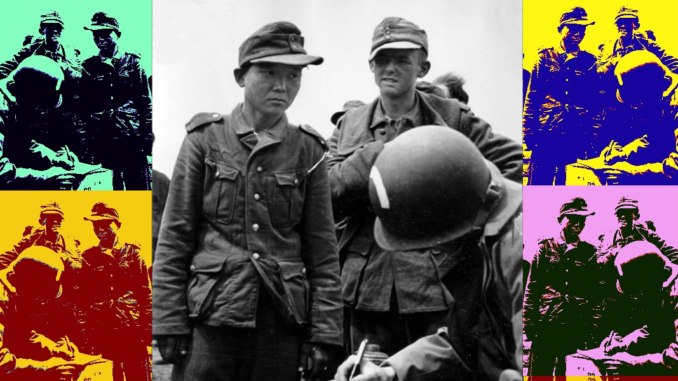
Strange things happen in war in addition to the unwanted things that happen to innocent people who find themselves displaced. This story is perhaps fiction, or perhaps it’s true. Documentation to prove the veracity of it all appears to be hard to come by or even non-existent. Yet, the story cannot be proven false merely due to a lack of a paper trail. It was wartime, after all, and in the midst of chaos the paperwork is often left undone, or it is lost or destroyed in the mayhem, particularly on the losing side. With or without records, fact or fiction, this story is worth telling if for no other reason than it is a reminder that countless millions of displaced persons were swept up involuntarily in the drama, their lives changed forever – if they were fortunate enough to survive the ordeal.
Yang Kyoungjong (1920-1992) was born in Shin Eu Joo [now in North Korea] which had been occupied and governed by Japan since the Japanese annexation of Korea in 1910. In 1938, at 18 years of age, Yang was conscripted into the Kwantung Army of Japan (the Imperial Japanese Army in Manchuria) and forced into battle at Khalkhin Gol, 20-31 August 1939.
A full three-fourths of the Japanese army were killed in combat at Khalkhin Gol by Soviet-Mongolian forces. Yang was lucky, if being captured and sent to a Soviet labor camp can be considered a lucky break. After three years of hard labor, his captors needed military conscripts to fight the invading Germans on the Eastern Front. Tens of thousands of labor camp prisoners, including Yang, were outfitted with Red Army uniforms and sent into battle against the Nazi invaders.
In the Ukraine, at the Battle of Kharkov (from 19 February to 15 March 1943), Yang was taken prisoner by the Wehrmacht and shipped to a German POW camp. He would not spend years there, as his new captors soon saw the need for conscripts to reinforce defenses in northern France against the Allied invasion everyone knew was coming.
Yang was now a member of the Wehrmacht’s Eastern Battalion, a unit comprised of Soviet prisoners, based just west of Utah beach on the Cotentin Peninsula in Normandy. Soon after D-Day, Lieutenant Robert Brewer, 506th Parachute Infantry Regiment, 101st Airborne Division, reported to headquarters the capture of several Japanese prisoners wearing German uniforms. None of the Americans present spoke Japanese, or for that matter, Chinese or Korean. Only later, after Yang and the other Asian prisoners were sent first to a British POW camp then to a POW camp in the United States did Yang’s Korean origins and the long road he took halfway around the world become known.
The United States released Yang from a POW camp in 1947. His hometown, in North Korea, was not accessible for repatriation. (The North Koreans, no doubt, would immediately suspect him to be a spy sent by the US). It’s not clear if Yang was repatriated somewhere in 1947 (such as South Korea) and then emigrated to the US, or just never left. In any case, he settled in Illinois where he lived until his death in 1992.
The idea that a soldier could fight for more than one country during a war is not unheard of. American paratrooper Joe Byerle, 506th PIR, fought with the Soviet Red Army after he jumped into Normandy with the 101st Airborne. He was captured by the Germans, escaped twice, and made it to Soviet lines.
Yang was just better at getting himself captured.
Question of the Night: Is there a question that hasn’t been asked before, but you wish the Owl would ask?
